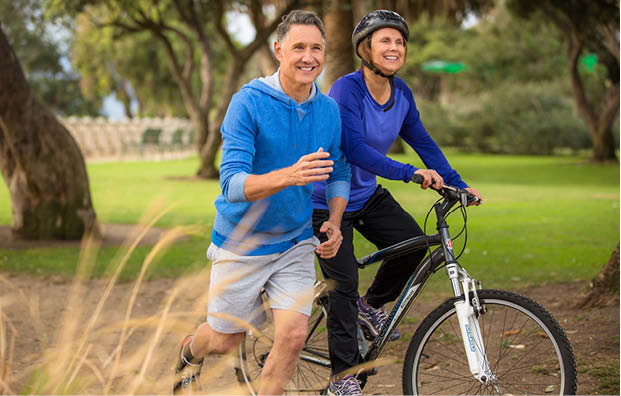Ill health is not inevitable and making the right choices in the early stages of retirement can help ensure we function well into older age, according to researchers from Deakin University’s Centre for Physical Activity and Nutrition Research (C-PAN).
C-PAN Associate Professor Sarah McNaughton, Lead Investigator in the Wellbeing, Eating and Exercise for a Long Life or WELL study, said that we are living longer, but the big challenge facing those who have just retired or approaching retirement is to remain healthy and enjoy a good quality of life as they age.
“We know from our research that as adults approach retirement age they go through a transition in their life and if they improve their diet and lifestyle at this stage it will lead to better health and quality of life for years to come.
“The WELL study also found that there are critical relationships between diet quality and general health, physical function, and emotional wellbeing at this point in their lives. These benefits are in addition to those we already know in relation to cardiovascular disease and diabetes,” she said.
Associate Professor McNaughton says pre-retirement is the ideal time to review your diet and lifestyle, just as you do with your finances to maintain that feeling of health and vitality.
“Chronic diseases such as obesity are known to increase from age 45 onwards, but it is estimated that 80 per cent of health problems associated with older age can be prevented or delayed if lifestyle changes are implemented in the 55 to 65 year age group.
“Our nutritional needs actually change as we age and we need more nutrient-dense foods and less energy-dense foods to avoid weight gain. In fact we need more nutritious food such as vegetables, fruits and whole grains as our bodies have to work harder to absorb the vitamins and minerals.
“Many retirees have to carefully watch their spending on food, however we know from our research that older adults consume too few vegetables and fruits, while national data has shown that over 30 per cent of their diet is made up of junk food.
“Poor health is not inevitable and we can’t let our bodies run on empty at this critical time,” she said.
Professor Aaron Russell, an expert in skeletal muscle development and health from C-PAN said that at the same time, many retirees are not sufficiently active to achieve good health.
“As we age there is a gradual reduction in our muscle mass which contributes to weakness, fatigue and makes it more difficult to perform exercise as well as when we were younger. Muscle mass is also very important for our metabolism, as less muscle mass means we are not as efficient in burning the energy that we take in with our food, which can contribute to weight gain.
“As we move into our 50’s and through to retirement, maintaining levels of physical activity such as walking and gardening with higher intensity exercise, such as resistance training, will help reduce muscle loss and allow us to remain socially active and enjoy leisure activities in retirement.
“Maintaining strong muscles into older age is essential for maintaining quality of life,” said Professor Russell.
Tips for a healthy retirement:
- If we start being physically active before we retire we can combat muscle loss more efficiently as we get older
- However, it is never too late to get back into, or start being physically active
- To reduce muscle loss, aim to be physically active every day and participate in some form of physical activity throughout your entire life
- Combine both endurance and resistance training which is often incorporated into organized circuit classes
- Different types of physical activity keep your muscles guessing and continuing to adapt
- Maintain a well-balanced diet including plenty of vegetables, fruits and wholegrains. Make sure to include low or reduced fat dairy foods such as milk and yoghurt to get enough calcium for healthy bones.
- Including foods rich in protein such as lean meats, fish, eggs and legumes is also important for rebuilding muscles as we age.
- Eating protein-enriched meals in the first few hours after exercise, especially resistance exercise, helps to maximise the muscle’s adaptive response to your workout.
- When shopping on a budget, plan your meals for the week and make a shopping list.
- When choosing vegetables and fruit, try and include lots of different varieties and think colours: green, orange, red and yellow.
- Vegetables and fruits in season will often be cheaper and taste better. Don’t forget frozen and canned vegetables (without added salt) as they are just as nutritious and sometimes more convenient.
C-PAN is a research centre with world class expertise in both nutrition and physical activity that over the past decade has made a real difference in improving the health of all Australians.
C-PAN’s work in physical activity and nutrition is leading the world globally in numerous areas including research into disadvantaged communities, children’s health and healthy ageing.



